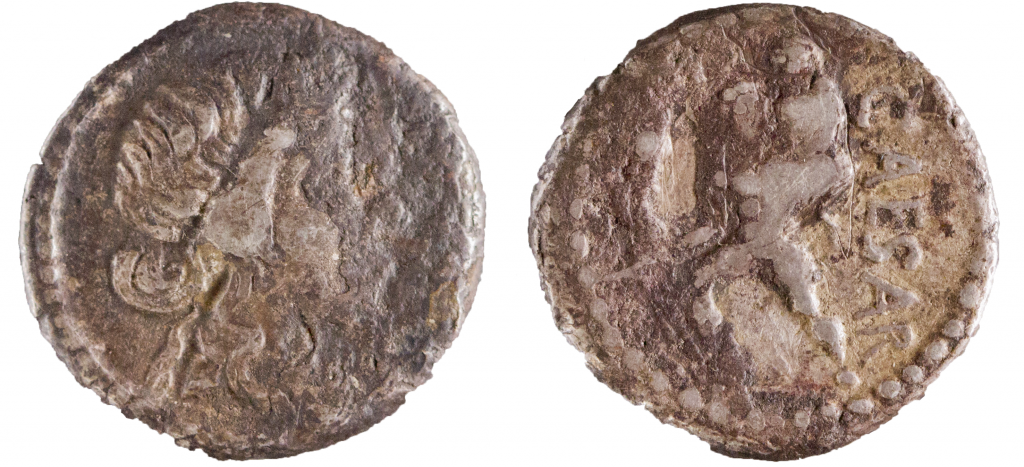July 13, 2015, by Will Leveritt
Happy Birthday Julius Caesar! Part I
Text by Mike Welbourn
Image © Mint Imperials
The date is not absolutely certain, and the year is subject to slight question but… happy birthday from us, nonetheless! To celebrate, we have a two-part blog entry today.
The first deals with events up to the point when the first triumvirate disintegrated; it will be followed by a post which deals with events from then until Caesars’s death.

AR denarius of Caesar. Obverse diademed head of Venus right. Reverse has CAESAR; Aeneas fleeing leftward with his father on his back, carrying palladium. 3.42g, 18mm, 12 o’clock. Coin courtesy of the University of Nottingham Museum.
On this day in 100 BC, Gaius Julius Caesar, arguably one of the most famous Romans of them all, was born in Rome, into the gens Julia, which claimed Venus and Aeneas among its distinguished ancestors. Caesar’s own branch of the family, the Caesares, had only begun to achieve a measure of political prominence in the mid-second century BC, and Caesar’s father (helpfully, also named Gaius Julius Caesar) was praetor and governor of the province of Asia. Caesar’s aunt, Julia, married the famous general and statesman Gaius Marius, the populist politician who entered into a civil war with the conservative Sulla.
Caesar aligned himself politically with Marius and with the popularis politics he embodied, proponents of which sought to win the support of the masses through populist measures and use this backing for their own ends; this contrasted with the optimate tradition to which Sulla belonged, which aimed always to defend the power and interests of the narrow senatorial elite.
Once Sulla achieved final victory against Marius and established himself as dictator, Caesar’s political allegiances marked him out as a target and he fled Rome, biding his time by serving with distinction in the legions in Asia and Cilicia until Sulla died in 78 and he felt safe enough to return to Rome.
One of the more colourful events in Caesar’s life occurred on his way home: he was captured by pirates who demanded a ransom of 20 talents. Caesar, who maintained a haughty demeanour throughout the episode, demanded they ask for 50. He also promised to return and execute his captors. They took this in jest, but after the ransom was paid and he had regained his freedom he raised a fleet, captured the pirates, and had them crucified.
Returning to Rome, he pursued a political career, becoming quaestor in 69. In 63 he made the audacious decision to run for the position of pontifex maximus, the high priest, in which he was successful. He went on to serve as praetor in 62, and subsequently governor of Hispania Ulterior, where his military achievements earned him a triumph.
He chose to forgo this honour to run for consul in 60 BC. Always a canny politician, in that year Caesar spied a chance to help his campaign for office. Marcus Crassus, the wealthiest man of the day, and Pompey the Great, the most high-profile general and politician of the period had been feuding for some years. Caesar realized that if they could be reconciled, the three of them had the money and the political influence to organize public business around their own personal interests. Caesar’s plan worked, and the three men formed what historians today call the First Triumvirate. Using their combined influence, Caesar was elected consul for 59 BC and strengthened the alliance by marrying his daughter, Julia, to Pompey.
Crassus and Pompey gained the policy concessions they had been seeking: in particular, the reorganization of the eastern Mediterranean which had been undertaken by Pompey in the late 60s BC, but had not been ratified by the senate was at last accepted, and Caesar put forward the bill for the granting of land to Pompey’s veterans which Pompey had sought.
In addition, Caesar revealed his continuing commitment to popularis politics by putting forward a bill for land redistribution to the poor of Rome. This was vehemently resisted by the senate and by Caesar’s consular colleague Marcus Bibulus, who attempted to use obnuntiatio – watching the skies for signs from the gods, which traditionally brought public business to an end – to prevent the bill being passed. However, Pompey and Crassus used their influence and a joint appearance with Caesar at a public meeting, at which public support for the measure became clear, to obtain passage of the bill. Caesar had thus alienated the influential conservatives in the senate, like Cato the Younger, and his decision to press ahead with the bill in the face of Bibulus’ religious injunction would come back to haunt him.
The power of the First Triumvirate also secured for Caesar the governorship of three provinces simultaneously – Cisalpine Gaul, Illyricum and later Transalpine Gaul – for five years rather than the normal one year. He took up his post in 58 BC. In 56 BC, the triumvirs met in the Italian town of Lucca to renew their alliance and to set out their future plans. Caesar’s governorship was extended for another five years, Pompey and Crassus would be made consuls for 55 BC, Pompey was to hold the governorship of the Spanish provinces, indirectly through subordinates, also for five years, and Crassus obtained that which he wanted most of all: the governorship of Syria and with it the chance to gain his own military glory via a campaign against the Parthian empire.
But at this point, the situation began to unravel…
No comments yet, fill out a comment to be the first

Leave a Reply